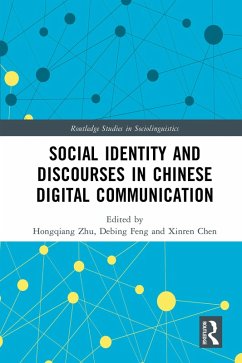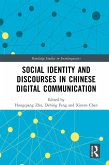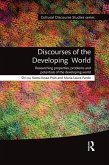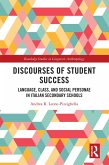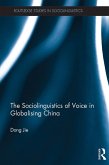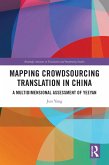Social Identity and Discourses in Chinese Digital Communication (eBook, PDF)
Redaktion: Zhu, Hongqiang; Chen, Xinren; Feng, Debing
43,95 €
43,95 €
inkl. MwSt.
Sofort per Download lieferbar

22 °P sammeln
43,95 €
Als Download kaufen

43,95 €
inkl. MwSt.
Sofort per Download lieferbar

22 °P sammeln
Jetzt verschenken
Alle Infos zum eBook verschenken
43,95 €
inkl. MwSt.
Sofort per Download lieferbar
Alle Infos zum eBook verschenken

22 °P sammeln
Social Identity and Discourses in Chinese Digital Communication (eBook, PDF)
Redaktion: Zhu, Hongqiang; Chen, Xinren; Feng, Debing
- Format: PDF
- Merkliste
- Auf die Merkliste
- Bewerten Bewerten
- Teilen
- Produkt teilen
- Produkterinnerung
- Produkterinnerung

Bitte loggen Sie sich zunächst in Ihr Kundenkonto ein oder registrieren Sie sich bei
bücher.de, um das eBook-Abo tolino select nutzen zu können.
Hier können Sie sich einloggen
Hier können Sie sich einloggen
Sie sind bereits eingeloggt. Klicken Sie auf 2. tolino select Abo, um fortzufahren.

Bitte loggen Sie sich zunächst in Ihr Kundenkonto ein oder registrieren Sie sich bei bücher.de, um das eBook-Abo tolino select nutzen zu können.
Examining how diverse social identities are constructed in digital communication in China, this edited collection provides a multi-dimensional exploration of the diverse, discursive forms and practices used to construct and present the "self" online.
- Geräte: PC
- mit Kopierschutz
- eBook Hilfe
Andere Kunden interessierten sich auch für
![Social Identity and Discourses in Chinese Digital Communication (eBook, ePUB) Social Identity and Discourses in Chinese Digital Communication (eBook, ePUB)]() Social Identity and Discourses in Chinese Digital Communication (eBook, ePUB)43,95 €
Social Identity and Discourses in Chinese Digital Communication (eBook, ePUB)43,95 €![Discourses of the Developing World (eBook, PDF) Discourses of the Developing World (eBook, PDF)]() Shi-XuDiscourses of the Developing World (eBook, PDF)29,95 €
Shi-XuDiscourses of the Developing World (eBook, PDF)29,95 €![Discourses of Student Success (eBook, PDF) Discourses of Student Success (eBook, PDF)]() Andrea R. Leone-PizzighellaDiscourses of Student Success (eBook, PDF)41,95 €
Andrea R. Leone-PizzighellaDiscourses of Student Success (eBook, PDF)41,95 €![The Sociolinguistics of Voice in Globalising China (eBook, PDF) The Sociolinguistics of Voice in Globalising China (eBook, PDF)]() Jie DongThe Sociolinguistics of Voice in Globalising China (eBook, PDF)43,95 €
Jie DongThe Sociolinguistics of Voice in Globalising China (eBook, PDF)43,95 €![Matteo Ricci and the Missionary Role in the Evolution of Chinese Lexicon (eBook, PDF) Matteo Ricci and the Missionary Role in the Evolution of Chinese Lexicon (eBook, PDF)]() Zhao MingMatteo Ricci and the Missionary Role in the Evolution of Chinese Lexicon (eBook, PDF)112,95 €
Zhao MingMatteo Ricci and the Missionary Role in the Evolution of Chinese Lexicon (eBook, PDF)112,95 €![Mapping Crowdsourcing Translation in China (eBook, PDF) Mapping Crowdsourcing Translation in China (eBook, PDF)]() Jun YangMapping Crowdsourcing Translation in China (eBook, PDF)41,95 €
Jun YangMapping Crowdsourcing Translation in China (eBook, PDF)41,95 €![Sociopragmatics of Japanese (eBook, PDF) Sociopragmatics of Japanese (eBook, PDF)]() Yasuko ObanaSociopragmatics of Japanese (eBook, PDF)41,95 €
Yasuko ObanaSociopragmatics of Japanese (eBook, PDF)41,95 €-
-
-
Examining how diverse social identities are constructed in digital communication in China, this edited collection provides a multi-dimensional exploration of the diverse, discursive forms and practices used to construct and present the "self" online.
Dieser Download kann aus rechtlichen Gründen nur mit Rechnungsadresse in A, B, BG, CY, CZ, D, DK, EW, E, FIN, F, GR, HR, H, IRL, I, LT, L, LR, M, NL, PL, P, R, S, SLO, SK ausgeliefert werden.
Produktdetails
- Produktdetails
- Verlag: Taylor & Francis eBooks
- Seitenzahl: 250
- Erscheinungstermin: 14. November 2024
- Englisch
- ISBN-13: 9781040147214
- Artikelnr.: 72275371
- Verlag: Taylor & Francis eBooks
- Seitenzahl: 250
- Erscheinungstermin: 14. November 2024
- Englisch
- ISBN-13: 9781040147214
- Artikelnr.: 72275371
- Herstellerkennzeichnung Die Herstellerinformationen sind derzeit nicht verfügbar.
Hongqiang Zhu is Professor of Linguistics at Jinan University, Guangzhou, China. Debing Feng is Professor of Linguistics at Hangzhou Normal University, China. Xinren Chen is Professor of English and Linguistics at Nanjing University and Executive Director of the China Research Center for Language Strategies, China.
Introduction: Approaching Social Identities and Discourses in Chinese
Digital Communication; Part I: Representation: Pragmatics, conversations,
corpus linguistics; Chapter 1. Chinese medical professionals' self-identity
construction in Xiaohongshu medical knowledge disseminating accounts by
Xinren Chen, Ruixin Cheng; Chapter 2. Constructing the image of a "corrupt
official" in the discourse of Weibo interaction: The case of the "Brother
Watch" event by Debing Feng and Xiaoping Wu; Chapter 3. Gender performances
of male and female politicians on social media: A corpus-assisted discourse
study by Ming Liu, Ruinan Zhao; Part II: Multimodality and
self-presentation; Chapter 4. Visual exclusion: Representation of Chinese
youth on Chinese social media by Rongle Tan, Yiqiong Zhang and Huiting Dai;
Chapter 5. The presentation of self in 'travelogues' on Chinese WeChat
Moments by Pan Pan, Hongqiang Zhu and Xinyu Liu; Chapter 6. Crossing
boundaries: How do Chinese influencers navigate pedagogical, therapeutic,
and rapport discourses and identities in live streaming commerce? by Panpan
Zhang (Penny), Tao Xiong, Yi Shi, Qi Huang and Xianghua Yan; Part III:
Social identity, platforms and social capital; Chapter 7. Cultural
identities of 'Chinese' style uploaders on digital platforms by Xin Zeng;
Chapter 8. Social media for the health campaign and solidarity among
Chinese fandom publics during the COVID-19 pandemic by Qiaolei Jiang, Shiyu
Liu, Yue Hu and Jing Xu; Chapter 9. Representing linguistic and cultural
diversity in a Chinese video game by Jia L and Guorong Hao
Digital Communication; Part I: Representation: Pragmatics, conversations,
corpus linguistics; Chapter 1. Chinese medical professionals' self-identity
construction in Xiaohongshu medical knowledge disseminating accounts by
Xinren Chen, Ruixin Cheng; Chapter 2. Constructing the image of a "corrupt
official" in the discourse of Weibo interaction: The case of the "Brother
Watch" event by Debing Feng and Xiaoping Wu; Chapter 3. Gender performances
of male and female politicians on social media: A corpus-assisted discourse
study by Ming Liu, Ruinan Zhao; Part II: Multimodality and
self-presentation; Chapter 4. Visual exclusion: Representation of Chinese
youth on Chinese social media by Rongle Tan, Yiqiong Zhang and Huiting Dai;
Chapter 5. The presentation of self in 'travelogues' on Chinese WeChat
Moments by Pan Pan, Hongqiang Zhu and Xinyu Liu; Chapter 6. Crossing
boundaries: How do Chinese influencers navigate pedagogical, therapeutic,
and rapport discourses and identities in live streaming commerce? by Panpan
Zhang (Penny), Tao Xiong, Yi Shi, Qi Huang and Xianghua Yan; Part III:
Social identity, platforms and social capital; Chapter 7. Cultural
identities of 'Chinese' style uploaders on digital platforms by Xin Zeng;
Chapter 8. Social media for the health campaign and solidarity among
Chinese fandom publics during the COVID-19 pandemic by Qiaolei Jiang, Shiyu
Liu, Yue Hu and Jing Xu; Chapter 9. Representing linguistic and cultural
diversity in a Chinese video game by Jia L and Guorong Hao
Introduction: Approaching Social Identities and Discourses in Chinese
Digital Communication; Part I: Representation: Pragmatics, conversations,
corpus linguistics; Chapter 1. Chinese medical professionals' self-identity
construction in Xiaohongshu medical knowledge disseminating accounts by
Xinren Chen, Ruixin Cheng; Chapter 2. Constructing the image of a "corrupt
official" in the discourse of Weibo interaction: The case of the "Brother
Watch" event by Debing Feng and Xiaoping Wu; Chapter 3. Gender performances
of male and female politicians on social media: A corpus-assisted discourse
study by Ming Liu, Ruinan Zhao; Part II: Multimodality and
self-presentation; Chapter 4. Visual exclusion: Representation of Chinese
youth on Chinese social media by Rongle Tan, Yiqiong Zhang and Huiting Dai;
Chapter 5. The presentation of self in 'travelogues' on Chinese WeChat
Moments by Pan Pan, Hongqiang Zhu and Xinyu Liu; Chapter 6. Crossing
boundaries: How do Chinese influencers navigate pedagogical, therapeutic,
and rapport discourses and identities in live streaming commerce? by Panpan
Zhang (Penny), Tao Xiong, Yi Shi, Qi Huang and Xianghua Yan; Part III:
Social identity, platforms and social capital; Chapter 7. Cultural
identities of 'Chinese' style uploaders on digital platforms by Xin Zeng;
Chapter 8. Social media for the health campaign and solidarity among
Chinese fandom publics during the COVID-19 pandemic by Qiaolei Jiang, Shiyu
Liu, Yue Hu and Jing Xu; Chapter 9. Representing linguistic and cultural
diversity in a Chinese video game by Jia L and Guorong Hao
Digital Communication; Part I: Representation: Pragmatics, conversations,
corpus linguistics; Chapter 1. Chinese medical professionals' self-identity
construction in Xiaohongshu medical knowledge disseminating accounts by
Xinren Chen, Ruixin Cheng; Chapter 2. Constructing the image of a "corrupt
official" in the discourse of Weibo interaction: The case of the "Brother
Watch" event by Debing Feng and Xiaoping Wu; Chapter 3. Gender performances
of male and female politicians on social media: A corpus-assisted discourse
study by Ming Liu, Ruinan Zhao; Part II: Multimodality and
self-presentation; Chapter 4. Visual exclusion: Representation of Chinese
youth on Chinese social media by Rongle Tan, Yiqiong Zhang and Huiting Dai;
Chapter 5. The presentation of self in 'travelogues' on Chinese WeChat
Moments by Pan Pan, Hongqiang Zhu and Xinyu Liu; Chapter 6. Crossing
boundaries: How do Chinese influencers navigate pedagogical, therapeutic,
and rapport discourses and identities in live streaming commerce? by Panpan
Zhang (Penny), Tao Xiong, Yi Shi, Qi Huang and Xianghua Yan; Part III:
Social identity, platforms and social capital; Chapter 7. Cultural
identities of 'Chinese' style uploaders on digital platforms by Xin Zeng;
Chapter 8. Social media for the health campaign and solidarity among
Chinese fandom publics during the COVID-19 pandemic by Qiaolei Jiang, Shiyu
Liu, Yue Hu and Jing Xu; Chapter 9. Representing linguistic and cultural
diversity in a Chinese video game by Jia L and Guorong Hao
